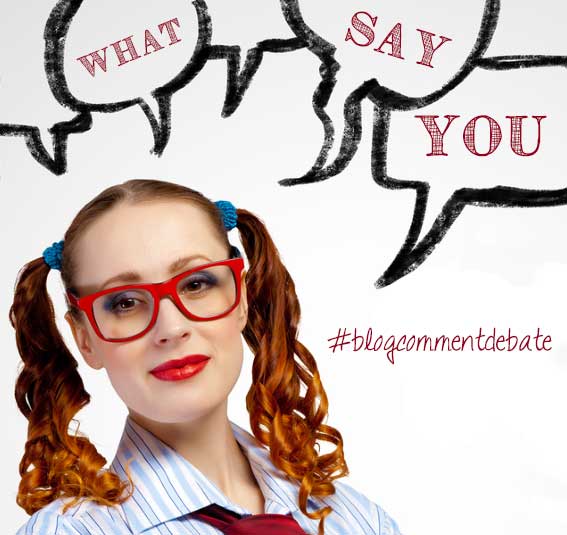 Ever since Copyblogger turned off their blog comments, this question has swirled all over the Internet.
Ever since Copyblogger turned off their blog comments, this question has swirled all over the Internet.
“If a blog doesn’t have comments, is it even a blog?”
There’s a lot changing in the blog/social media world and comments are no exception. As a personal blogger, I’ve chosen to turn mine off, but is it really the best thing for all bloggers?
Let’s unpack all the arguments for and against blog commenting.
Most of us are probably more familiar with the arguments FOR comments:
- It helps create community around your blog
- It gives other bloggers a chance to respond and start discussion
- It’s a nice way to leave a backlink to your own blog (this encourages more comments)
- It helps you find new people to connect with
- It enhances the discussion
- It generates buzz
- It helps the blogger hone his/her craft
- It adds social proof to your writing
- It helps the blogger to take the pulse of his/her audience
Before the explosion of social media, blog comments were one of the only ways to interact with your audience. If you were a new blogger, the fastest way to find and meet new bloggers, was simply to find their blogs and leave a meaningful comment. This in turn, would encourage the other blogger (and commenters) to click on the link and check the new person out.
That was then, this is now. Comments still do the following…
Friendships form when a blogger comments regularly on a site. It’s also a way to show reciprocity. If you are continually commenting and sharing, the blogger is likely to do it in return. In essence, comments are a way to get in on the discussion, and build exposure.
Another benefit of comments is in the social proof. If you stumble upon a piece of content that has 500 comments, you are going to pay more attention to it than if it has five. If a blog post has a lot of discussion, it automatically gains more authority and credibility to a new reader.
Blog comments are a way to measure how your post is impacting your audience. Sometimes you’ll get 50 or 100 comments and you’ll think, “Wow. This is a hot button topic. I should write about it more!” The same works in reverse. If no one comments, you might think it’s a topic you should table.
Blog comments also stretch us as writers. When someone disagrees with us (or points out an error), it helps us to remember for next time, “Hey, maybe I should be more careful how I word that…”.
When bloggers turn on plugins like CommentLuv, you are extended “good karma” to those who take the time to read. They are able to leave a link to their latest post, and on big blogs, this can provide a great source of traffic to a little blogger who’s left a meaningful comment.
Comments keep the discussion going, long after it’s been posted. Oftentimes, people add value and information to the topic at hand (like for example, in a recipe post) and in this way, the comments become another source of content for people to read!
Here are some of the arguments AGAINST comments:
- Unless you have a ton of helpful comments, they are a time suck to respond to.
- Not responding to each and every comment looks rude and can turn off readers.
- Dealing with spam can be an exhausting job.
- The rate of comments can influence how and what you write about (and it isn’t always accurate). Since lots of people use smartphones, commenting is less likely (because it’s time consuming on a tiny keypad).
- Those who really want to comment will find you another way, especially if you’re active on social media.
- You’d rather have people commenting on social media, where the conversation is public.
- If people only have time to comment or share, you’d rather a share.
- Social shares are just as much proof of authority as comments.
- Taking away the option to comment eliminates the blogger games.
The world is different today than when blogs began. Now there are a multitude of ways to connect with other bloggers and your readers. We have Facebook, Twitter, Pinterest, Google plus, Communities, Intsagram, etc. Every major platform uses hashtags and makes it easy to curate a conversation.
Dealing with the blog commenting game can be exhausting. People get offended when you don’t respond. They might just be commenting on your blog for the backlink, for the reciprocity, or because it’s “mandatory” for a link up. Blog comment fatigue is a real problem in blogging circles. So many wasted and dis-ingenuine words all in the name of exposure.
If you have a great blog, but you are new to the scene – people may not pay attention to you if they see how few comments you have. The lack of social proof may turn them off before you’ve even been given a chance.
Talking on social media does several things for the blogger. First, it puts it out in public, not in the corner. Two, it allows more eyes (non-blogger eyes) to see the conversation and potentially add their two cents to the discussion. Three, it gives the commenter exposure as well. Four, it’s more efficient. Better to spend an hour talking on Twitter about your blog post with people (and also simultaneously building your Twitter following), then to answer all your comments, and then go over to Twitter and try to generate some new discussion over there.
Bloggers have more time to write, to curate great content from others, and to engage on social media. There is no wasted time trying to decide if a comment is genuine or not. Spam is no longer an issue. Those who feel really passionate about the subject will easily be able to find you if they have something to say.
So how do I know what’s right for me?
Well, remember this. Turning comments on and off is an easy thing to do. You can always try it out for a while and see how it feels. If you are still on the fence about the issue, I’ve developed a quick 10 question quiz to help you determine if turning off comments may be right for you. (I’m not liable for the quiz okay people)?
[slickquiz id=1]
I’ll be on social media discussing the blog comment debate!
Talk to me on Twitter! Tweet to @jdeneen4

